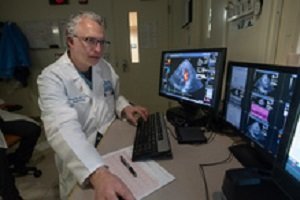First Metro Detroit Heart Failure Patients Treated with Stem Cells

Henry Ford Study Looks at Post-heart Attack Effect
DETROIT – The first Metro Detroit-area stem cell treatment for those who have a chronically weakened heart muscle function following a heart attack has been performed in a trial now underway at Henry Ford Health System.
The first patient, a metro Detroit-area man in his 60s, recently participated in the trial at Henry Ford Hospital, said Dr. Gerald Koenig, Henry Ford Health System's principal site investigator for the CardiAMP Stem Cell Heart Failure Clinical Trial. Henry Ford Hospital one of a couple sites in Michigan participating in the nationwide trial.
Previous studies, including those undertaken at Henry Ford Hospital, indicate the use of stem cells can rejuvenate heart muscle’s ability to work more efficiently or recover from a heart attack. As a result, patients who have had issues breathing or getting around due to early symptoms of heart failure have seen significant improvements in their condition.
“Long-term, we hope it will improve the heart’s pumping quality, so they don’t go into heart failure,” said Dr. Koenig, Director of Cardiac Catheterization Laboratory Clinical Research for the Henry Ford Heart & Vascular Institute and Chief of Medicine at Henry Ford West Bloomfield Hospital “This can improve a patient’s quality of life by reducing symptoms, plus it could significantly reduce the number of hospitalizations due to heart failure – and also significantly reduce healthcare costs.”
The first patient was experiencing Class II to III symptoms of heart failure, which includes mild to moderate shortness of breath and/or angina, as well as some limitation during ordinary activity.
“He was looking for a better quality of life,” Dr. Koenig said. Since then, an additional two patients have undergone the procedure and another is scheduled for early July.
Patients experience heart failure when the heart cannot pump enough blood to meet their body’s needs, due to heart attack or another heart issue. Doctors historically have focused on improving the heart’s ‘ejection fraction,’ or amount of blood the heart can move out of the left ventricle. Doctors have prescribed various medications over the past 15 or 20 years to treat the condition.
Stem cell therapy seems to work by improving the heart’s ability to repair and regenerate itself by improving the heart’s ability to signal at the molecular level, Dr. Koenig said. The process may help heart muscle work more efficiently, while also helping to build up small blood vessels in the heart to improve function.
Dr. Koenig has participated in other stem cell or gene-based trials at Henry Ford Health System, including one in 2012 looking at the effect of injecting stem cells directly into the heart vessels shortly after patients experienced a heart attack. That trial found that the stem cells lessened the heart attack's magnitude. The current study provides stem cell treatment much later after the patient's heart attack, when they are stable but experiencing heart failure symptoms.
The procedure involves first harvesting stem cells from the patient’s bone marrow, a half-hour long process done under light anesthetic. In a separate procedure, the patient is sedated and the cardiologist gains access to the heart through an artery in the groin region. The cardiologist then inserts a specialized catheter into the patient’s left ventricle, and injects about 200 million harvested stem cells into various regions of the heart muscle.
The randomized study means that a ratio of 3:2 patients will receive actual stem cells. Koenig said that if the study proves successful, patients who did not receive stem cells during the trial will be offered the treatment at no cost after the trial. The trial procedure is routinely covered by Medicare and has received approval from other providers, he added. Koenig said he expects to have preliminary outcome data in about a year.
“Any advancements we can make in the treatment of heart failure is a win for patients and the healthcare system in general,” said Dr. Henry Kim, Division Chief of Cardiology for Henry Ford Health System. “Heart failure is a big, long-term issue in cardiology.”
To find out more about the trial, visit clinicaltrials.gov, or contact clinical research coordinator Melanee Schimmel, BSN, RN, at (313) 916-7614 or mschimm2@hfhs.org.
Media Contact: Tammy Battaglia / Tammy.Battaglia@hfhs.org / 248-881-0809 cell/text
.svg?iar=0&hash=F6049510E33E4E6D8196C26CCC0A64A4)

/hfh-logo-main--white.svg?iar=0&hash=ED491CBFADFB7670FAE94559C98D7798)









